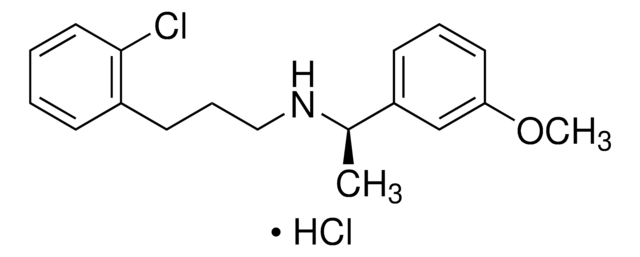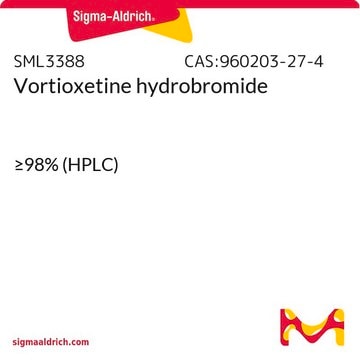SML2012
Cinacalcet hydrochloride
≥98% (HPLC)
Synonym(s):
AMG 073 hydrochloride, KRN 1493 hydrochloride, N-[1-(R)-(-)-(1-naphthyl)ethyl]-3-[3(trifluoromethyl)phenyl]-1-aminopropane hydrochloride, NPS 1493 hydrochloride
About This Item
Recommended Products
Assay
≥98% (HPLC)
form
powder
optical activity
[α]/D -24 to -32°, c = 0.5 in methanol
storage condition
desiccated
color
white to beige
solubility
DMSO: 2 mg/mL, clear
storage temp.
2-8°C
InChI
1S/C22H22F3N.ClH/c1-16(20-13-5-10-18-9-2-3-12-21(18)20)26-14-6-8-17-7-4-11-19(15-17)22(23,24)25;/h2-5,7,9-13,15-16,26H,6,8,14H2,1H3;1H/t16-;/m1./s1
InChI key
QANQWUQOEJZMLL-PKLMIRHRSA-N
Looking for similar products? Visit Product Comparison Guide
Application
- to stimulate calcium-sensing receptor (CaSR) in thick ascending limb (TAL) of the male Sprague-Dawley rats to study the effect of altered claudins levels on calciuria and magnesiuria in metabolic acidosis
- as a calcimimetic positive allosteric modulator (PAM) of CaSR to determine the structural rearrangements of human CaSR upon activation
- as a calcium-sensing receptor (CaSR) agonist to study the effect of CaSR on tumor cell proliferation in lung adenocarcinoma (LUAD) cell line
Biochem/physiol Actions
Signal Word
Danger
Hazard Statements
Precautionary Statements
Hazard Classifications
Acute Tox. 4 Oral - Aquatic Chronic 4 - Eye Dam. 1 - Skin Corr. 1A - Skin Sens. 1B - STOT RE 2
Target Organs
eye - retina
Storage Class Code
8A - Combustible corrosive hazardous materials
WGK
WGK 3
Flash Point(F)
Not applicable
Flash Point(C)
Not applicable
Certificates of Analysis (COA)
Search for Certificates of Analysis (COA) by entering the products Lot/Batch Number. Lot and Batch Numbers can be found on a product’s label following the words ‘Lot’ or ‘Batch’.
Already Own This Product?
Find documentation for the products that you have recently purchased in the Document Library.
Customers Also Viewed
Our team of scientists has experience in all areas of research including Life Science, Material Science, Chemical Synthesis, Chromatography, Analytical and many others.
Contact Technical Service












